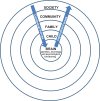Systemic psychotherapy with families where someone has an autism spectrum condition
- PMID: 27030899
- PMCID: PMC4927906
- DOI: 10.3233/NRE-161314
Systemic psychotherapy with families where someone has an autism spectrum condition
Abstract
Background: Families play an important role in facilitating the development and well-being of children with autism spectrum conditions.
Objectives: After setting the scene with a clinical example, and providing a brief discussion of the current thinking about the aetiology of Autism spectrum conditions, this paper provides a review of the literature regarding the practice of systemic psychotherapy with families in which a child has an autism spectrum condition (ASC).
Methods: A search of databases and journals revealed a large number of opinion papers regarding how family therapists might work with families of children with ASCs and a smaller number of papers that describe or explore actual clinical practice.
Results: Pilot studies using qualitative methods and practice-based evidence in the form of descriptions of clinical work offer a solid footing on which to develop systemic practice to help families where a person has an ASC.
Conclusion: Given the multifactorial nature of the aetiology of ASCs it is suggested that systemic interventions have the potential to influence changes at multiple levels of functioning for the child and the family.
Keywords: Autism spectrum condition; family therapy; systemic psychotherapy.
Figures

Similar articles
-
Fathers' Experience With Autism Spectrum Disorder: Nursing Implications.J Pediatr Health Care. 2016 Sep-Oct;30(5):453-63. doi: 10.1016/j.pedhc.2015.10.012. Epub 2015 Dec 15. J Pediatr Health Care. 2016. PMID: 26700165
-
Family System Interventions for Families of Children with Autism Spectrum Disorder.Child Adolesc Psychiatr Clin N Am. 2015 Jul;24(3):571-83. doi: 10.1016/j.chc.2015.02.009. Child Adolesc Psychiatr Clin N Am. 2015. PMID: 26092740 Review.
-
Understanding autism: how family therapists can support parents of children with autism spectrum disorders.Fam Process. 2012 Jun;51(2):250-64. doi: 10.1111/j.1545-5300.2012.01399.x. Fam Process. 2012. PMID: 22690864 Review.
-
Exploring Exceptions and Discovering Solutions: A Case Presentation of Autism and the Family.Fam Process. 2020 Dec;59(4):1891-1902. doi: 10.1111/famp.12500. Epub 2019 Oct 15. Fam Process. 2020. PMID: 31613401
-
Caring for children with autism spectrum condition in paediatric emergency departments.Emerg Nurse. 2017 Jul 13;25(4):30-34. doi: 10.7748/en.2017.e1713. Emerg Nurse. 2017. PMID: 28703063
Cited by
-
Embodied Imagination and Metaphor Use in Autism Spectrum Disorder.Healthcare (Basel). 2021 Feb 13;9(2):200. doi: 10.3390/healthcare9020200. Healthcare (Basel). 2021. PMID: 33668445 Free PMC article.
-
Pre-School Teachers' Knowledge, Belief, Identification Skills, and Self-Efficacy in Identifying Autism Spectrum Disorder (ASD): A Conceptual Framework to Identify Children with ASD.Brain Sci. 2020 Mar 13;10(3):165. doi: 10.3390/brainsci10030165. Brain Sci. 2020. PMID: 32183022 Free PMC article. Review.
-
Brief report: Does "healthy" family functioning look different for families who have a child with autism?Res Autism Spectr Disord. 2020 Apr;72:10.1016/j.rasd.2020.101527. doi: 10.1016/j.rasd.2020.101527. Epub 2020 Feb 18. Res Autism Spectr Disord. 2020. PMID: 32123539 Free PMC article.
-
Pilot Test of the Maximizing Adolescent Post-Secondary Success (MAPSS) Intervention: Supporting Parents of Autistic Youth.Am J Occup Ther. 2021 May 1;75(3):7503180070p1-7503180070p11. doi: 10.5014/ajot.2021.045815. Am J Occup Ther. 2021. PMID: 34781348 Free PMC article.
-
Family therapy for autism spectrum disorders.Cochrane Database Syst Rev. 2017 May 16;5(5):CD011894. doi: 10.1002/14651858.CD011894.pub2. Cochrane Database Syst Rev. 2017. PMID: 28509404 Free PMC article.
References
-
- American Psychiatric Association Diagnostic and Statistical Manual of Mental Disorders. 5th ed Washington, DC: American Psychiatric Association; 2013.
-
- Baron-Cohen S., Scott F. J., Allison C., Williams J., Bolton P., Matthews F. E., & Brayne C. (2009). Prevalence of autism-spectrum conditions: UK school-based population study. The British Journal of Psychiatry, 194(6), 500–509. - PubMed
-
- Bettelheim B. (1967). The Empty Fortress New York.
-
- Bradford K. (2010). Brief education about autism spectrum disorders for family therapists. Journal of Family Psychotherapy, 21(3), 161–179.
-
- Bradford K. (2010). Supporting families dealing with Autism and Asperger’s Syndrome. Journal of Family Psychotherapy, 21, 149–156.
Publication types
MeSH terms
LinkOut - more resources
Full Text Sources
Other Literature Sources
Medical
Miscellaneous

